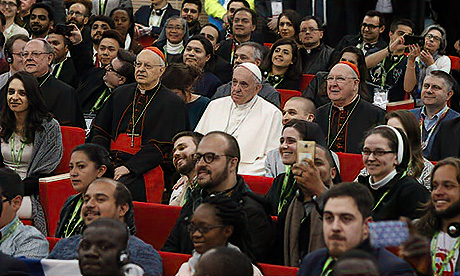This is a Synod on synodality, we were told.
My first reaction was: what is synodality?
“Synodality means walking together,” we were then told.
But this had to be explained several times, and not only to those less educated.
Synodality is a strange word, even for the more literate.
So, I have a problem with the word used to describe the theme of the Synod because talking about a synodal Church does not attract much attention. It does not make people want to participate in the discussions.
I think this is the case for many laypeople.
Therefore, we should start by translating this somewhat “learned” word into something that is immediately understandable, even into a slogan that will excite people.
Only then will everyone be eager to contribute something to the common journey.
Walking together
It seems to me that “walking together” is, first of all, a source of deep joy.
And during this synod, it is this joy that I would like us to begin expressing, to make it clear that what counts is the journey with the one who is the only source of all joy, the one who came to dwell with us, among us, in us.
Our Church will be synodal because it brings this good news to the people of the third millennium.
But I think that while our joy is focused on the word “together”, we should also be interested in the journey.
Indeed, though it is relatively easy to demonstrate to African Christians how their faith liberates them, it seems to me more complicated to show how the Church concretely removes the obstacles that prevent us from journeying.
Yes, we can consider that poverty is our first problem, but I believe that our freedoms, stifled on a daily basis, shackle us even more.
We don’t feel that our Church is taking charge of this.
Talking about a synodal Church does not attract much attention. It does not make people want to participate in the discussions.
Sometimes, when the people who are primarily responsible for this situation (heads of state and members of government) are received in Rome by the pope, and they then boast about it, it disturbs us and even hurts us.
So, I cannot help but take up this sentence of a Togolese laywoman: “Has the pope forgotten us? Why do his messages never mention our country?”
Of course, the pope must receive everyone.
And, obviously, he cannot speak about all countries, but this synod could be an opportunity to deal with political issues in Africa.
In this way, the whole Church will take charge of the situation of this continent which has already been wounded by slavery and colonization, and which continues to suffer because of inhumane systems of political management.
Pope Francis went to Lampedusa.
He never forgets the migrants.
That moves us, but one day – in all transparency – we will have to talk about the roots of migration, what pushes young people to leave Africa.
If we leave this Synod with the promise of taking charge of this problem, then our Church will become more synodal.
Focusing the problems on the West and on priests
Much has been done since the Second Vatican Council (1962-65) to make it possible for everyone to see themselves in the problems that the Church takes to heart.
But it seems to me that the way in which these problems are posed still reflects a certain focus on priests and on the West.
This is the case with all the questions concerning sexuality.
Yes, sexuality is a reality that is at the heart of human life.
Yes, sexual abuse is a problem for us in Africa as much as anywhere else, but the angle from which sexuality is considered obscures certain realities of Africa.
For example, there’s the question of procreation for the Christian couple, or the place of the child when a woman is forced to conceive before marriage, or family cohesion that is based first of all on biological bonds, etc.
It is true that Africans themselves could take up all this at the local or regional level, but then why create commissions throughout the Church to deal with sexual abuse and not leave it to certain Churches alone to deal with this?
Finally, I believe the Church will be synodal when it is no longer considered normal that Africa is always in some way invisible, at the back of the queue in the Church’s journey.
- Maryse Quashie, a lecturer in educational sciences at the University of Lomé (Togo), is a member of the Diocesan Synodal Advisory Team of Lomé.
